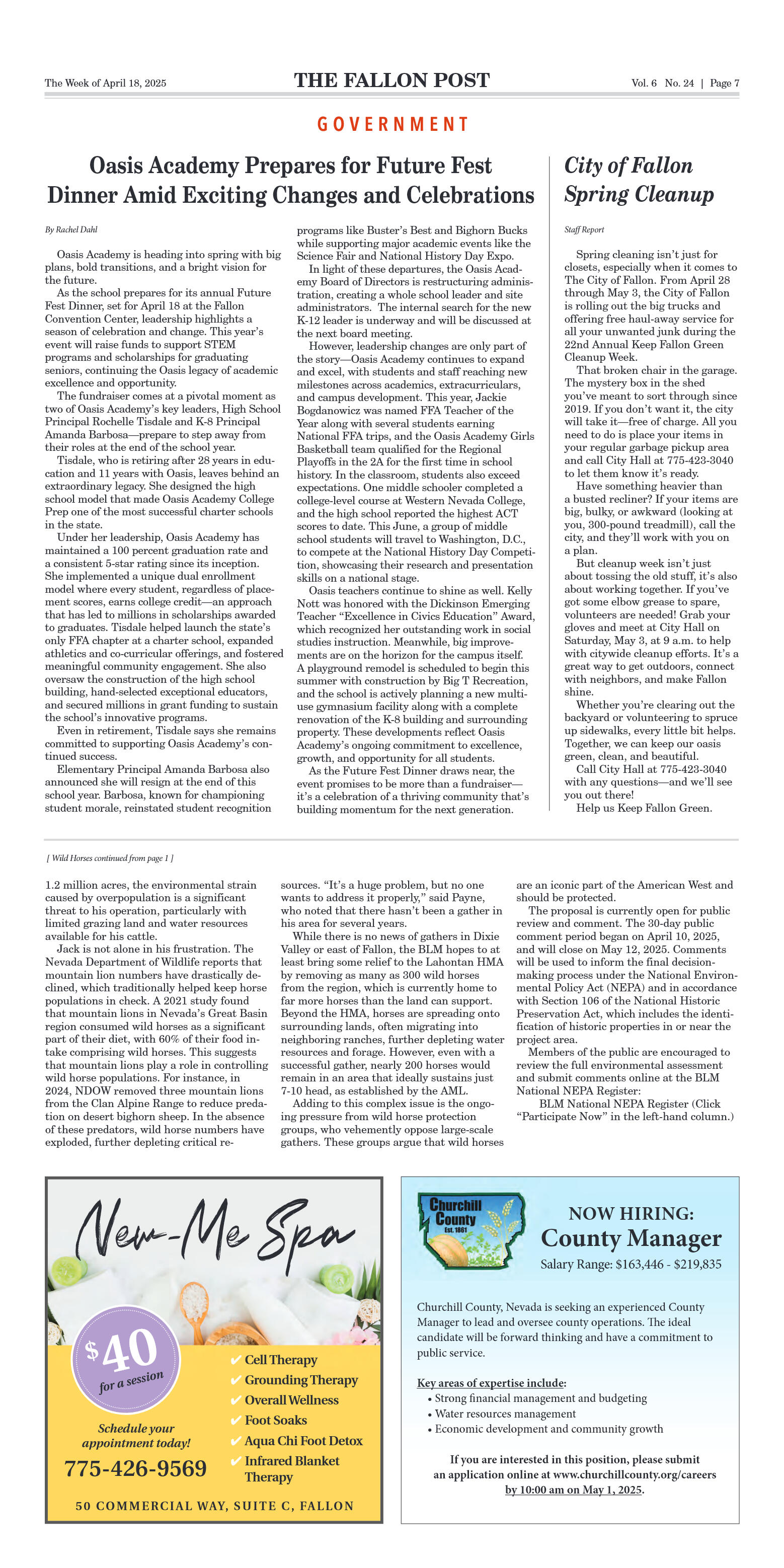Edited March 17: To clarify that starlings eat two pounds of food in a month.
An unusual issue of contention has arisen in the Lahontan Valley over the last couple of weeks, and if you spend any time on Facebook's Fallon 411, you would not have been able to miss it. Not only is there a heated debate over the use of propane cannons in the valley, but there is also a flyer circulating to stop or modify their usage.
While Fallon is, by and large, an agriculture community, most residents are not likely familiar with the use of propane cannons for bird control. In particular, European Starlings. The small black speckled birds may look harmless but are highly invasive and are unwelcome additions to feedlots and dairies, mainly for the economic damage they cause and their potential to compromise the health of cattle and other livestock.
Starlings can easily reach unmanageable numbers in the cooler months when food sources are scarcer. According to wildlife specialists, 1,000 Starlings can consume two pounds of food in a month—unfortunately, they flock by the tens of thousands to dairies. Compounding the problem is that cattle feed is a mix of expensive ingredients specific to the animals' needs for milk or meat production. In short, these pests cost dairies thousands of dollars per day.
In addition to feed consumption, the birds also spread seed (including weed seeds) for miles. Starlings are also an aggressive species that often push native birds from their habitats. Due to the size of their flocks (murmuration), they can also interfere with aviation. Further, their droppings are corrosive and toxic. Starlings carry multiple diseases, external parasites, and indirectly, West Nile Virus.
Dairy and cattlemen have spent years trying to find ways to control Starlings, which were brought to the U.S. in the 1800s by a well-intentioned group that wanted to introduce all birds mentioned by Shakespeare to Central Park. With no natural predators, they have become highly invasive.
In years past, poisoning was the population control method of choice. However, it is an expensive remedy that requires specific conditions to be successful. Additionally, most nearby homeowners don't usually appreciate poisoning, as the result is dead birds - which some research states can be toxic to pets and other animals. Shooting the birds is also a costly remedy requiring a great deal of ammunition and people to do the shooting. Also, if surrounding dairies do not participate in the abatement, the starling population continues to thrive and return to the dairy regardless of the method used.
Many dairymen have adopted the use of propane cannons. The cannons, fueled by propane, mimic a shotgun's sound and are designed to scare the birds from the feed bunks and commodity bins where the feed is stored. This method, used in conjunction with shooting, delivers some efficacy. However, it also has one major drawback - noise. And a lot of it.
In response, a petition is circulating to address the issue of noise pollution in Churchill County. Kelly Campbell, who lives near one dairy that started using the cannons in December, explained, "We are in support of the dairies and we understand that they want to keep their cows healthy," said Campbell, "and we aren't saying they can't use them, just not so much." According to Campbell, who last lived on her property for 23 years and long before the nearby dairy went into operation, the cannons go off about three times a day – two or three blasts per minute for two or three hours, three times a day. Some dairies run their cannons all day. One of Campbell's neighbors, who lives even closer to the dairy, reported that the cannons rattle his windows. "Not only were we here long before the dairy, but this is a new practice they have started," continued Campbell. She went on to explain that they do not want local dairies to lose hundreds of thousands of dollars a year but asked the question, "Is it necessary for the cannons to go off so often?"
Further, Campbell says that the new research states that cannons are not an effective starling repellent. Michelle Beers Anderson, who put forth the petition, authored a lengthy post once the topic on Fallon 411, stating, "Most research articles state that birds, including starlings, are highly intelligent and adaptable. Cannons only work for a minimal time before the birds adapt to the noise and quickly correlate the noise with food. Most farmers who use cannons also have to use them in conjunction with other deterrents for them to be effective and the rate at which the blast happens is quickly increased. Not to mention the negative effect it has on natural predators that help control and deter the starling population around farms." Anderson went on to suggest other methods like the use of Falconry and drones, used with other deterrents, can reduce starling populations by 25-30%.
"There is a monetary impact that comes with the use of cannons as well, such as a reduction in property values within a 20-mile radius of where cannons are used, as buyers prefer quiet enjoyment of their property," stated Anderson. "What would be the impact of farmers utilizing a more quiet deterrent?" Anderson lives near a dairy and reported that the cannons blast 3-4 times a minute until five at night or sometimes later. "Just because it's been done this way for years doesn't mean it's the best way or there isn't a better, more efficient way of doing things that also provide some consideration for your neighbors."
Many local residents were up in arms over the petition, with most comments backing the local dairymen and their chosen bird control solution. The conversation soon moved to Fallon 411 Rant and Rave, where Christopher E. Miller stated, "I don't live by a dairy but am in the county and can hear them. I love Fallon and support these dairies doing what is necessary to scatter the pests."
Dan Orozco, a longtime employee of Hillside Dairy, explained that the use of cannons would cease for the season once warmer weather hits, stating, "The cannons will be gone in a few weeks. Spring time scatters the birds." In a normal year, the cannons cease operating once spring is in full swing and start back up in the fall. While this may offer temporary relief from the noise, it is not a long-term solution for residents in earshot of the cannons.
One dairy has taken measures by barricading the cannons with straw bales to try to keep the noise away from neighbors, but some nearby residents are still hoping for another solution. Campbell suggested one such alternative - the use of lasers, specifically Agrilaser. Lasers purportedly offer a clean, silent solution that is harmless to birds, can repel across long distances and areas up to 3,000 acres, remains effective over time, have no adverse effect on livestock. However, lasers are not inexpensive.
Another Facebook user, Larry Pruit, Jr., commented, "I'm not opposed to finding other methods for population control of the starlings. But I am against arbitrary regulations on local business that hurts our local economy. We have plenty of that at the state and federal levels. If you want the cannons to go away, then work with the dairymen to find and implement a suitable solution."
Non-lethal forms of bird control don't impact the ever-increasing starling population. Thus the need for abatement measures continue to increase. Further, the rising cost of abatement puts an additional financial strain on dairymen. Propane cannons offer some control but are most effective when used in conjunction with active bird shooting. However, both methods mean loud shotgun and cannon blasts.
Fallon's dairymen are watching their bottom line and hoping it's not being carried away in the belly of a winged pest. Simultaneously, some homeowners who live near dairies have had their peaceful and tranquil spaces upturned by dairies need to implement new practices. It's not just an economic problem; it is a social one. "We are in total support of the dairies," said Campbell, "but do the cannons have to go off so much – or better yet, can we talk about other alternatives?"











































Comment
Comments